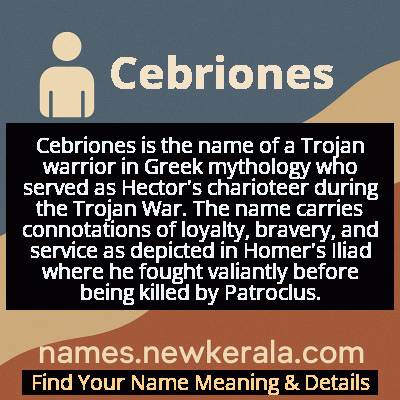Cebriones Name Meaning & Details
Origin, Popularity, Numerology Analysis & Name Meaning of Cebriones
Discover the origin, meaning, and cultural significance of the name CEBRIONES. Delve into its historical roots and explore the lasting impact it has had on communities and traditions.
Name
Cebriones
Gender
Male
Origin
Greek
Lucky Number
9
Meaning of the Name - Cebriones
Cebriones is the name of a Trojan warrior in Greek mythology who served as Hector's charioteer during the Trojan War. The name carries connotations of loyalty, bravery, and service as depicted in Homer's Iliad where he fought valiantly before being killed by Patroclus.
Cebriones - Complete Numerology Analysis
Your Numerology Number
Based on Pythagorean Numerology System
Ruling Planet
Mars
Positive Nature
Generous, passionate, energetic, and humanitarian.
Negative Traits
Impulsive, impatient, moody, and can be overly emotional.
Lucky Colours
Red, maroon, scarlet.
Lucky Days
Tuesday.
Lucky Stones
Red coral, garnet.
Harmony Numbers
1, 2, 3, 6.
Best Suited Professions
Military, sports, philanthropy, leadership roles.
What People Like About You
Courage, energy, leadership, generosity.
Famous People Named Cebriones
Cebriones (Mythological)
Warrior and Charioteer
Served as Hector's charioteer during the Trojan War and fought bravely before being killed by Patroclus
Cebriones (Literary)
Mythological Character
Featured prominently in Homer's Iliad as a loyal companion to Hector and notable Trojan warrior
Cebriones (Academic Reference)
Classical Studies Subject
Studied as an example of secondary but important characters in Homeric epic who contribute to narrative depth
Name Variations & International Equivalents
Click on blue names to explore their detailed meanings. Gray names with will be available soon.
Cultural & Historical Significance
In classical studies, Cebriones represents the important supporting characters who give depth to Homer's world, showing that even secondary figures had complex roles and meaningful deaths in the narrative structure of Greek epic poetry. His character illustrates the Greek concept of arete (excellence) as it applies to those in supporting roles, demonstrating that honor and bravery were not exclusive to leaders and main heroes. The preservation of his story across millennia speaks to the enduring power of Homer's characterizations and the Greek understanding of the human experience in warfare.
Extended Personality Analysis
Based on his portrayal in the Iliad, Cebriones would be characterized by extreme loyalty, courage, and dedication to duty. As Hector's charioteer, he demonstrates reliability and trustworthiness in the heat of battle, suggesting a personality marked by steadfastness and commitment to his leaders and cause. His willingness to fight alongside Hector and his eventual death in service indicate bravery and martial prowess that went beyond mere driving skill—he was a warrior in his own right.
Modern psychological interpretation might view him as representing the archetype of the faithful companion—someone who derives purpose from supporting others while maintaining their own strength and capability. The circumstances of his service suggest a disciplined individual who understood hierarchy and his place within it, yet possessed sufficient skill and courage to be trusted with the safety of Troy's greatest hero. His character suggests qualities of situational awareness, quick thinking under pressure, and the ability to remain calm in dangerous circumstances—essential traits for anyone responsible for maneuvering a chariot in the chaos of ancient battlefield conditions.
Modern Usage & Popularity
The name Cebriones remains extremely rare in modern times, primarily used in academic contexts, classical studies, and by enthusiasts of Greek mythology. It has not appeared in modern baby name registries or popularity charts, maintaining its status as a purely mythological and literary name. Contemporary usage is largely confined to scholarly references, historical fiction, and occasionally as a unique character name in fantasy literature or games with classical themes. The name's strong association with a specific mythological character and its ancient sound make it unlikely to gain widespread modern popularity, though it may appeal to parents seeking deeply classical and historically significant names with strong literary connections who want something distinctive from mainstream mythological names like Achilles or Odysseus.
Symbolic & Spiritual Meanings
Symbolically, Cebriones represents loyalty, service, and the importance of supporting roles in great endeavors. His character symbolizes how even those not in leadership positions contribute significantly to larger causes and historical events. The name carries connotations of steadfastness and reliability—qualities essential for a charioteer responsible for a hero's mobility and safety in battle. Metaphorically, Cebriones embodies the idea that greatness often depends on capable supporters, and that honor exists in faithful service as much as in leadership. His dramatic death also symbolizes the suddenness and brutality of fate in warfare, serving as a reminder of the interconnectedness of all participants in historical events, regardless of their prominence or social standing in the traditional hierarchy.

